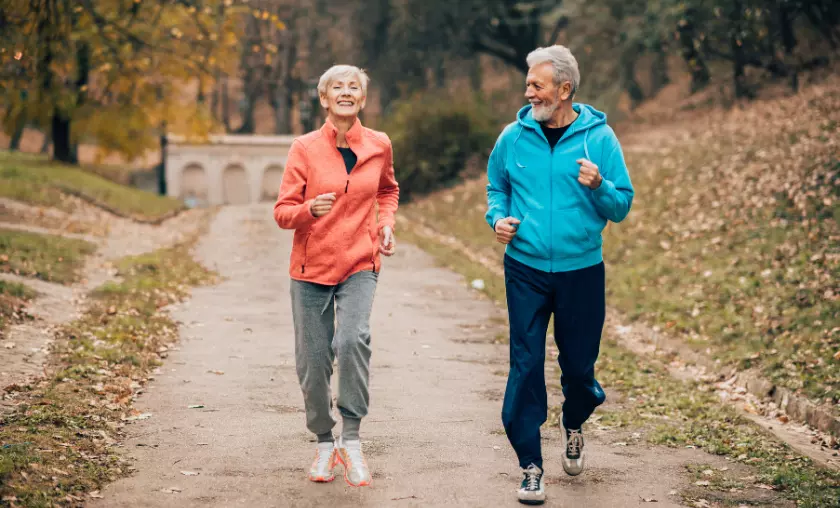Exercise offers a multitude of benefits that extend far beyond physical appearances. Regular physical activity is a cornerstone of a healthy lifestyle, supporting our physical well-being and mental, emotional, and social dimensions. From boosting cardiovascular fitness and enhancing muscle strength to alleviating stress and improving mood, the advantages of exercise are wide-ranging and transformative.
In this article, we will delve into the comprehensive benefits that exercise brings to our lives, highlighting its positive impact on various aspects of our overall health and well-being.
Exploring the Benefits of Exercise
Physical Health
Strengthening Your Body
Physical health is a cornerstone of well-being, and exercise plays a pivotal role in enhancing and maintaining it. Regular physical activity strengthens muscles, bones, and joints, improving overall fitness and reducing the risk of chronic conditions such as cardiovascular disease, diabetes, and obesity. Engaging in activities challenging your body’s endurance, flexibility, and strength fosters improved physical performance and promotes a healthier immune system.
- Cardiovascular Health: Regular exercise strengthens the heart muscle, improves blood circulation, and lowers blood pressure, reducing the risk of cardiovascular diseases such as heart attacks and strokes.
- Muscular Strength: Exercise promotes muscle growth and endurance by stimulating muscle fibers, increasing strength and overall muscle function.
- Bone Density: Weight-bearing exercises like walking, running, and resistance training help enhance bone density, reducing the risk of osteoporosis and fractures.
- Joint Health: Engaging in low-impact exercises such as swimming or cycling supports joint health by promoting fluid movement and reducing the risk of joint-related issues.
- Flexibility: Incorporating stretching exercises and activities like yoga or Pilates improves flexibility, enhancing joint range of motion and reducing the risk of injuries.
From boosting metabolism to enhancing circulation, exercise empowers your body to function optimally, helping you navigate daily activities with greater ease and vitality.
Weight Management
A Key to Wellness
Weight management is a pivotal aspect of overall wellness, and exercise plays a crucial role in achieving and maintaining a healthy weight. Regular physical activity helps create a balance between the calories consumed and those expended, which is essential for weight control.
Engaging in exercises that elevate your heart rate, such as cardiovascular activities and strength training, aids in burning calories and boosting metabolism. Moreover, exercise contributes to building lean muscle mass, which can increase your resting metabolic rate, further supporting weight management efforts.
- Calorie Expenditure: Physical activity burns calories, creating a caloric deficit crucial for weight loss by consuming more energy than consumed.
- Metabolism Boost: Regular exercise increases metabolism, leading to continued calorie burn even after the workout.
- Muscle Gain: Strength training and resistance exercises promote muscle growth, which raises the resting metabolic rate and contributes to weight loss and maintenance.
- Appetite Regulation: Exercise can help regulate appetite hormones, leading to better control over food intake and reducing the chances of overeating.
- Lifestyle Transformation: Incorporating exercise into daily life supports healthy habits and behaviors, fostering a sustainable weight loss and maintenance approach.
By incorporating consistent exercise into your routine, you contribute to shedding excess pounds and set the stage for improved body composition, increased energy levels, and enhanced self-confidence.
Mental Well-Being
Elevating Your Mood
Mental well-being is intricately linked to physical activity, as exercise profoundly impacts mood and promotes emotional wellness. Regular physical activity triggers the release of endorphins, often called “feel-good” hormones, which contribute to reduced stress, anxiety, and depression.
Additionally, exercise offers a valuable outlet for releasing pent-up energy and tension, promoting a sense of relaxation and emotional balance. Whether it’s a brisk walk, a yoga session, or a challenging workout, each type of activity can enhance cognitive function, boost self-esteem, and improve overall emotional resilience.
- Endorphin Release: Exercise stimulates the release of endorphins, which are natural mood enhancers that alleviate stress, anxiety, and depression.
- Stress Reduction: Engaging in physical activity helps reduce cortisol levels, a stress hormone, leading to improved stress management and overall relaxation.
- Neurotransmitter Balance: Exercise supports the balance of neurotransmitters like serotonin and dopamine, contributing to better mood regulation and emotional well-being.
- Cognitive Function: Regular physical activity enhances cognitive function, promoting better focus, memory, and mental clarity.
- Mind-Body Connection: Activities like yoga and mindfulness exercises foster a stronger mind-body connection, reducing stress and promoting emotional resilience.
By making exercise a consistent part of your routine, you empower yourself with a natural tool for fostering mental clarity, managing stress, and enhancing your overall emotional well-being.
Boosting Energy Levels
Igniting Vitality
Boosting energy levels is one of the remarkable benefits that exercise offers, reinvigorating both the body and mind. Regular physical activity enhances cardiovascular fitness and improves the efficiency of the respiratory system, resulting in increased oxygen supply to muscles and tissues. This oxygenation, combined with the release of endorphins, leads to a heightened sense of vitality and alertness.
- Improved Oxygen Supply: Exercise enhances cardiovascular function, leading to better oxygen delivery to muscles and tissues, which in turn boosts energy levels.
- Endorphin Release: The release of endorphins during physical activity promotes a natural sense of vitality and reduces feelings of fatigue.
- Enhanced Metabolism: Regular exercise increases metabolism, leading to better energy utilization from food and improved overall energy levels.
- Better Sleep: Engaging in physical activity improves sleep quality, leading to more restorative sleep and reduced daytime fatigue.
- Stress Reduction: Exercise helps manage stress, which can be a significant contributor to feelings of fatigue, leading to improved overall energy levels.
Over time, as your fitness improves, daily tasks become less taxing, and you find yourself with more sustained energy throughout the day.
Enhanced Cognitive Function
Exercise for the Brain
Exercise isn’t just beneficial for the body; it’s a powerful tool for enhancing cognitive function and brain health. Physical activity promotes increased blood flow to the brain, delivering oxygen and essential nutrients that support optimal brain function.
This boost in circulation also encourages the growth of new brain cells and strengthens neural connections, which are vital for memory, learning, and overall cognitive performance. Additionally, exercise triggers the release of neurotransmitters that enhance mood and cognitive clarity.
Link Between Physical Activity & Cognitive Abilities
Whether it’s a brisk walk, a cardio workout, or engaging in activities that challenge coordination and balance, each exercise sharpens cognitive abilities and preserves brain health as you age.
Improved Sleep
Restorative Rest Through Exercise
Improved sleep is a valuable outcome of regular exercise, profoundly affecting overall well-being. Engaging in physical activity helps regulate the body’s internal clock, known as the circadian rhythm, which governs sleep-wake cycles. Consistent exercise contributes to more restful and restorative sleep, whether a morning jog or an evening yoga session. Additionally, releasing endorphins during exercise helps alleviate stress and anxiety, which can often interfere with sleep.
- Regulated Circadian Rhythm: Exercise helps synchronize the body’s internal clock, promoting a more consistent sleep-wake cycle and improving sleep quality.
- Deeper Sleep: Engaging in physical activity contributes to deeper and more restorative sleep, leading to increased feelings of refreshment upon waking.
- Reduced Sleep Onset Time: Regular exercise can shorten the time it takes to fall asleep, allowing you to quickly transition into a restful slumber.
- Stress Reduction: Physical activity releases endorphins, which help alleviate stress and anxiety, creating a conducive mental state for improved sleep.
- Less Sleep Disruption: Consistent exercise is associated with fewer sleep disturbances, leading to uninterrupted sleep and an overall better sleep experience.
Incorporating regular physical activity into your routine creates a positive cycle of improved sleep that enhances your physical, mental, and emotional health, fostering a more energized and rejuvenated version of yourself each day.
Bone Health
Building a Strong Foundation
Bone health is a crucial aspect of overall well-being, and exercise plays a pivotal role in building and maintaining strong bones. Weight-bearing exercises, such as walking, jogging, and resistance training, stimulate the bones to adapt and become denser over time. This is particularly important in preventing conditions like osteoporosis, which weakens bones and increases the risk of fractures.
- Weight-Bearing Impact: Weight-bearing exercises place stress on bones, stimulating bone remodeling and increasing bone density.
- Muscle Strengthening: Strength training and resistance exercises improve muscle mass, supporting bones and reducing the risk of fractures.
- Bone Adaptation: Regular exercise prompts bones to adapt and become stronger, promoting overall skeletal health and reducing the risk of osteoporosis.
- Joint Health: Engaging in physical activity supports the health of joints and surrounding tissues, maintaining flexibility and reducing the risk of injuries.
- Mineral Retention: Exercise promotes better retention of bone-strengthening minerals like calcium and phosphorus, further contributing to improved bone density and reduced osteoporosis risk.
Engaging in regular physical activity also supports the health of your joints and surrounding connective tissues, enhancing overall mobility and reducing the risk of injuries.
Social Connections
Fostering Relationships
Social connections are vital to human well-being, and exercise offers a unique platform for fostering meaningful relationships. Whether through group fitness classes, sports teams, or simply working out with a friend, exercise provides an opportunity to bond with others who share similar interests.
These connections create a sense of community and support and enhance motivation and accountability. Engaging in physical activities together promotes a shared sense of achievement and enjoyment, which can lead to lasting friendships.
- Shared Goals: Engaging in group activities or sports creates a sense of camaraderie through shared goals, fostering a strong sense of connection among participants.
- Motivation and Accountability: Exercising with others provides built-in motivation and accountability, as group members encourage each other to stay consistent and achieve fitness goals.
- Sense of Community: Group activities form a community where individuals can find like-minded people, reducing feelings of isolation and promoting a sense of belonging.
- Positive Peer Influence: Interacting with others who prioritize health and fitness can positively influence lifestyle choices and behaviors beyond exercise.
- Celebration of Achievements: Accomplishing fitness milestones together fosters a sense of achievement and celebration, strengthening social bonds and creating lasting memories.
Additionally, the social interactions that come with exercise contribute to reduced feelings of isolation and improved overall mental and emotional well-being. By integrating exercise into your social life, you reap the physical benefits and cultivate a richer and more fulfilling social network.
Longevity & Quality of Life
Active Aging
Embracing an active lifestyle is crucial to longevity and a higher quality of life. Regular exercise has numerous health benefits that contribute to healthy aging. Physical activity helps maintain cardiovascular health, bone density, and muscle strength, reducing the risk of age-related ailments such as heart disease, osteoporosis, and sarcopenia. Active aging through exercise extends one’s lifespan and ensures those additional years are filled with vitality and independence.
- Cardiovascular Health: Regular exercise reduces the risk of heart disease and other cardiovascular issues, promoting a longer and healthier life.
- Bone Strength: Engaging in weight-bearing activities supports bone density, reducing the risk of fractures and enhancing overall mobility in later years.
- Muscle Maintenance: Exercise preserves muscle mass and strength, preventing age-related muscle loss and promoting functional independence.
- Cognitive Vitality: Physical activity supports brain health, reducing the risk of cognitive decline and enhancing mental clarity as you age.
- Quality of Life: Regular exercise contributes to a higher quality of life by promoting physical fitness, mental well-being, and independence, allowing you to enjoy your later years to the fullest.
By prioritizing physical activity, you invest in a healthier and more fulfilling life journey, unlocking the potential to relish every moment and maintain your physical and mental well-being well into your golden years.
Conclusion
In summary, the myriad benefits of exercise extend far beyond physical fitness, touching every aspect of our well-being. This article has illuminated how regular physical activity not only enhances cardiovascular health, builds strength, and promotes weight management but also elevates mood, reduces stress, and fosters cognitive sharpness.
The power of exercise to improve sleep quality, boost energy levels, and enhance overall quality of life is undeniable. From young to old, beginners to seasoned athletes, the advantages of an active lifestyle are accessible to all. Remember that every step, every rep, and every stretch brings us closer to a healthier, happier self.
FAQ’s
What Are the Physical Benefits of Regular Exercise?
Regular exercise improves cardiovascular health, strengthens muscles and bones, aids in weight management, enhances flexibility, and boosts overall physical fitness.
How Does Exercise Impact Mental Health?
Exercise releases endorphins, the “feel-good” hormones, which reduce stress, anxiety, and depression. It also improves cognitive function and promotes better sleep.
Can Exercise Help With Weight Management & Fat Loss?
Yes, exercise burns calories and increases metabolic rate, aiding in weight loss. Combining exercise with a balanced diet is essential for effective weight management.
What Role Does Exercise Play in Preventing Chronic Diseases?
Regular exercise reduces the risk of chronic diseases like heart disease, diabetes, and certain cancers. It helps maintain healthy blood pressure, cholesterol levels, and blood sugar.
How Can Exercise Improve Cognitive Function?
Exercise increases blood flow to the brain, promoting the growth of new brain cells and enhancing cognitive abilities such as memory, focus, and learning.
To Read More Similar Articles, Click Here.
Thanks for Visiting Our Website. If You Appreciate Our Work, Kindly Show Us Some Support in Our Comments Section 🙂



